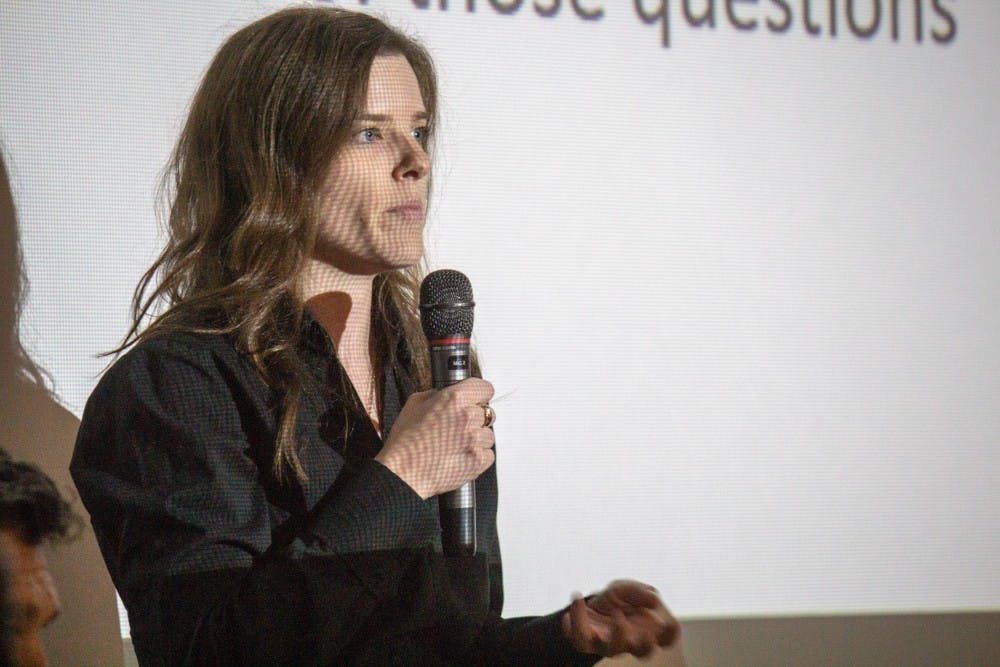On Wednesday evening, five Democratic candidates running in the Nov. 6 midterm elections attended a panel held by the MSU NAACP, Alpha Kappa Alpha Sorority, Incorporated and the MSU College Democrats.
Featured on the panel was Elissa Slotkin, who is running for U.S Congress; Sarah Anthony, who is running to be a member of the Michigan House of Representatives in the 68th District; Julie Brixie, who is campaigning to be a member of the MI House of Reps in the 69th District; Curtis Hertel Jr., who is running for reelection in the Michigan Senate for the 23rd District and Kelly Tebay, who is running to be a member of the Michigan State University Board of Trustees.
Prior to starting the event, it was announced that the panel was designed to be bipartisan. However, there were no conservative candidates sitting on the panel.
After a quick set of introductions, the questions began to roll in.
The first topic discussed by the panel was combatting mental health problems, more specifically depression, among college students.
Slotkin said it is common for her–since coming into the public eye–to be stopped on the street or even at the grocery store about different mental health issues. She said she doesn’t believe it's too extreme to say we are in the midst of a mental health crisis.
She also mentioned how those with mental health issues should have the ability to get the help they deserve.
“One of the big things that we need to do is expand options for care, particularly for people come forward and say they need help," Slotkin said.
Tebay weighed in on the matter, saying that cost should never be a reason why someone misses out on receiving help on a college campus. If elected, she said she plans on making sure a student on campus can always receive the care they deserve, and not walk out with a bill.
The next question for the panel was about how each of the candidates was going to handle the possible repeal of the landmark U.S. Supreme Court case Roe v. Wade.
In the hypothetical situation that Roe v. Wade was repealed, Julie Brixie said Michigan has a law in place that deems it illegal for anyone to assist in a miscarriage. In other words, this law would essentially make carrying out an abortion a criminal act.
Sen. Hertel later jumped in and mentioned that this law was put in place during the 1920s, well before Roe v. Wade, and would take effect after the repeal of Roe v. Wade.
“One of the first things I want to do is get rid of that old, archaic law,” Brixie said. “If we go to a place where Roe v. Wade is gone, it’s going to rely on the states to regulate it.”
The third question of the night focused on the rising cost of college tuition.
Julie Brixie, who campaigned on the idea of lowering the price of college tuition, spoke first.
One of the things she mentioned was how the state of Michigan used to provide roughly 80 percent of the operating budget for higher education, but today that number has shrunk to somewhere between 15 to 20 percent.
As someone who, if elected, could have an influence in the cost of tuition, Kelly Tebay mentioned how she feels MSU should implement a system much like the University of Michigan has to help combat some of the costs of college.
U-M has a program in place that ensures if you are an in-state student who has an average family income less of than $60,000 a year, the costs of college will be covered by the university.
Sarah Anthony spoke on how, often times, people debate on whether or not a college degree is worth the time it takes to earn one.
Anthony said she gives credit to her college degree for helping her career path.
Support student media!
Please consider donating to The State News and help fund the future of journalism.
“By the year 2020, 70 percent of the jobs in Michigan will require a bachelor’s degree,” Anthony said. “Your degree that you’re working on is worth it. Despite the narrative, it is worth it.”
Hertel said his plan is to change the current tax plan to stop giving big corporations massive tax breaks and making them pay their fair share. With the increased tax revenue, he thinks the state of Michigan would be able to increase the amount of funding for university operating costs.
“If we are going to solve this problem, we have to stop the giveaways to every corporation in the state. We have to raise their taxes, and make sure they are paying for their part of educating Michigan," Hertel said.
The final question of the night was put forth by a member of the audience, who asked what the panel about their thoughts and ideas around the significantly smaller graduation rate among minority students.
A common theme in the answers was that preparation for college doesn’t start on your first day of college, but rather that it starts during the K-12 schooling.
Hertel cited a legal suit in which the Attorney General of Michigan, who is currently running for Governor, said reading is not a fundamental right for children in Michigan. Hertel believes he is “absolutely dead wrong” and that every child has the right to an education.
Discussion
Share and discuss “Democratic candidates attend panel at MSU, discuss mental health and tuition” on social media.







